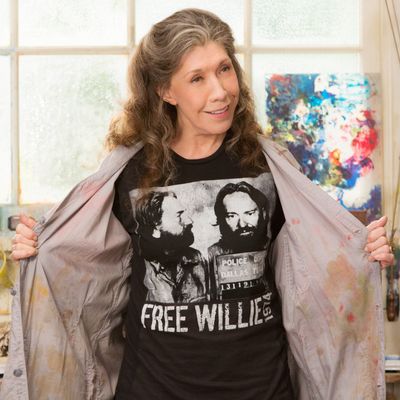
Comedy pilots are often set on the Day Everything Changed. Diane gets dumped and loses her job, but maybe she can work here at Cheers? Rachel flees her wedding and shows up at her friend Monica’s apartment. Michael Bluth decides to stay with his nut-bar family in California after all. It’s Dave’s first day as the boss at this radio station. This creates an inherent fish-out-of-water setup and engenders a vulnerability in at least one main character. Plus, it’s an opportunity for a lot of exposition: “Hey, I’m new here, now let me explain to you my background while also highlighting a few of my unusual comic quirks! Now please, explain your respective deals to me.” Grace and Frankie has a similar big-change pilot: Today’s the day Grace and Frankie’s husbands announce they’re leaving their wives for each other. They’ve been having an affair for 20 years, and now they want to come out of the closet and get married. Boom! Opening credits.
Actually, that’s where the opening credits should be, because Grace and Frankie is secretly a very conventional sitcom, but instead of being a multi-camera show from ten — more? — years ago, it’s a new Netflix show right now. So it doesn’t have that short cold-open, even though rhythmically and spiritually, it ought to. (The opening titles, which instead are the very first thing in the episode, are terrific.) Over the six episodes made available for review, this discordance popped up over and over. The bigness of the physical comedy, the pacing of jokes, the existence of set-’em-up, knock-’em-down jokes in the first place, and a seeming aversion to authentic human pain — all hallmarks of a show better off in front of a live studio audience.
The show, created by Marta Kauffman (Friends) and Howard J. Morris (Home Improvement), stars Jane Fonda and Lily Tomlin as the newly dumped women, longtime frenemies who find themselves living together (of course!) now that their husbands (Martin Sheen and Sam Waterston, respectively) have decided to come out. Fonda’s Grace is uptight, wears clip-in hairpieces, is often rude to people in the service industry, and places high importance on appearance and prestige. Tomlin’s Frankie is as hippy-dippy as they come, burning sage, wearing comfortable shoes, and pronouncing hummus in an affected way. You might call these two … an odd couple. And lo, they are. Sheen’s Robert and Waterston’s Sol are frustratingly less defined, even though their screen time is still substantial and their story line couldn’t be more rich for exploration.
In a multi-camera comedy, we expect a level of artifice. That’s part of the reason we have laugh tracks: to create a bridge for intimacy that would otherwise be lacking. Humor frequently relies on a sense of togetherness. Just think of how often one has to “be there” to be in on a joke. In single-camera comedies, sometimes that connection is developed through direct addresses to the camera — see: popularity of the mockumentary format — or from omniscient voice-overs. And sometimes that sense of closeness is created through the portrayal of tenderly articulated genuine human behavior. Think of how Party Down locks in on its characters biggest, truest weaknesses and insecurities. Or how The Comeback subtly weaves in moments where Valerie is in repose and we see just how much she “performs” her own life. Louie is every shame synapse that ever fired in anyone’s brain. Grace and Frankie never finds that intimacy, and were it a more meta show I’d suggest that that in some ways echoes the idea of two people whose 40-year marriages were so fundamentally flawed.
Grace and Frankie isn’t meta, though. It’s mostly bawdy, with Fonda and Tomlin turning in to-11 performances with lots of big takes and broad physical choices. Tomlin, mercifully, gives Frankie a sense of humanity, a textured personhood that overrides some ho-hum material (binge-eating, played-for-jokes panic attacks). Frankie seems to be the only one making jokes for her own benefit or for the benefit of other characters; everyone else seems to be dropping strange zingers or participating in unusual behavior that goes unremarked upon. One of Grace and Robert’s adult daughters wonders how she’s going to tell her children about everything. “Why don’t you start with, ‘Do you know where poop comes from?’” offers the other. Who is that joke for? Not the other people in the scene. That’s a joke for an absent audience. In a multi-camera comedy, we expect characters to just be weird. Kramer’s gotta Kramer. But in a single-camera comedy, it’s Dwight’s gotta Dwight — still weird, but the other people notice and react.
I wish the show had more reacting overall. Sol and Robert are finally able to live the life they’d dreamed of, and yet their relationship feels oddly inert and unpassionate. They share one chaste kiss in the first episode, and that’s it. One of Frankie and Sol’s adult sons, Coyote (Ethan Embry), is in recovery, but his sobriety is played as a superficial bit. Grace’s extended family blows her off, but again, it’s played lightly rather than catastrophically. Even the various meltdowns feel like a montage from a crappy Nancy Meyers knockoff movie: ice cream! Whiskey! The beach!!! Is this supposed to seem real or not real?
Grace and Frankie doesn’t feel real enough, which is too bad, considering how direly our society needs real stories about women, about queer people, about older people, and about change. Real isn’t the same as realistic — set it in Santa’s workshop, or have everyone be working for the alien octopus rebellion or whatever, but let the ideas and feelings and behaviors stem from credible emotions. Or set it in front of a studio audience and let their actual laughter be the reality scaffolding holding things in place. Either way.

